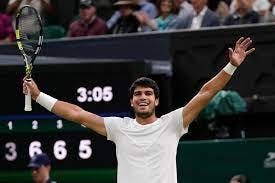No generation gap is too big for Alcaraz, Djokovic
A four hour, 42 minute Wimbledon win by Alcaraz portends more tennis poetry.
John McEnroe knew where the path went. To become the best tennis player in the world and to become a success in his own head, he had to get over, around or through Bjorn Borg.
Many had tried. All had failed. Borg had won four consecutive Wimbledons going into 1980. He had won the French Open six times. No one could jar Borg out of his zone that he had built on the baseline. McEnroe was determined to flush him out.
In 1980 he pushed Borg to a Wimbledon final that might have been the best ever played, at least until Sunday. Borg lost a fourth-set tiebreaker and had to reach all the way to hell to win 8-6 in the fifth. But McEnroe would beat Borg at the U.S. Open, an event Borg never won, and then would break the Wimbledon streak in four sets in 1981. When McEnroe again beat Borg in New York, the Swedish champ left the facility immediately, shunning the postmatch celebration. Soon after, he retired. Later, we learned that Borg had received death threats during that weekend.
But McEnroe was marooned in several ways. Slaying the dragon wasn’t very fulfilling if the dragon wasn’t interested in replicating himself. As a sports fan McEnroe knew how important a protagonist could be, and he had envisioned this series lasting almost as long as Chris Evert vs. Martina Navratilova. He has admitted that Borg’s departure shifted the ground under his own feet.
Carlos Alcaraz doesn’t have to worry about that. The dragon whose head he captured Sunday isn’t going anywhere.
Alcaraz might have handed Djokovic his first Centre Court loss in 10 years at Wimbledon Sunday, but Djokovic survived Alcaraz’s light show in the second and third sets and won the fourth. Then Djokovic got broken one time in the fifth, and that was enough. Alcaraz won that set, 6-4, and his first Wimbledon, at age 20. He had won two more points than Djokovic had. It did take him four hours and 42 minutes, but maybe this generation has a pretty good attention span after all.
And now every Alcaraz-Djokovic match will be appointment TV. Will Alcaraz play as well in New York next month as he did when he won his first Slam last year, with Djokovic absent? Will Alcaraz loosen Djokovic’s hold on the Australian Open next January, an event Djokovic has won 10 times?
Will we have this rivalry for years to come? When they return to Wimbledon next year, Djokovic will be 37. A lot of those questions are up to him, but if he can maintain the hunger and the will after 23 Slam championships, there will be a few more days like Sunday, when breakfast at Wimbledon ran into brunch and then maybe a trip to In-N-Out. The tennis could not have been tastier.
Djokovic sprinted out to a 6-1 victory in the first set, but Alcaraz sprang back to win a tiebreaker in the second. The third set was crucial, sort of like a Game 5 in a best-of-7 basketball series. Alcaraz was up, 3-1, and then set his mind to breaking Djokovic’s serve, even though the champ had lost only three service games in the tournament. It took 25 minutes to get it done but he did, and won that set, 6-1.
“If I hadn’t done that I wouldn’t have been able to lift the trophy,” Alcaraz said.
Djokovic called Alcaraz the best player he had ever faced, which might cause some double-taking in the Federer and Nadal households but also might be true. Alcaraz had to be that good to deal Djokovic his first loss at Wimbledon since 2017 and his second loss in 12 five-setters there.
His speed and the force are obvious and have been for a couple of years. What Alcaraz has mastered is the combination of two aspects that are endemic to championships. He adjusts and he fights.
He throttled back his game after the first set and realized he didn’t have to win every point on the first available ball. He also showed he’d been working on his second serve, winning half the points in those situations.
Djokovic normally finds a place in every match to establish a beachhead, and he closes such matches out with great velocity. Here, every run he made was answered by another physically improbable strike by Alcaraz, who also has learned the intricacies of the grass court drop shot even though he had played only 17 grass matches before this.
Alcaraz was 19 when he won last year’s U.S. Open, the same age Rafael Nadal was when he took his first Slam. Djokovic was 20 when he passed that bar, and Roger Federer 21. Alcaraz clearly will carry tennis for the next few years, as he succeeds the Federer-Djokovic-Nadal troika, but who else will rival him? Danill Medvedev is an accomplished, dynamic player who foiled Djokovic’s hopes of winning a same-year Grand Slam. Alcaraz blew him out in three 6-3 sets in the semifinal.
I might be fuzzy on the details here, but the Dodgers once had a utility infielder named Luis Alcaraz. They were playing Houston in the Astrodome and used Alcaraz as a pinch-runner.
The man in charge of the press box microphone was named Orland Sims. He was also the Astros’ public relations director. He made the pro forma announcement but called the runner “Alcatraz.”
The people sitting around him pointed this out. So, without a hitch, Sims turned on the microphone again and said, “Attention. The pinch-runner’s name is Alcaraz, not Alcatraz. After all, no man is an island.”
It appears Alcaraz is headed for his own island. He also knows it would be easier to vote Djokovic off than to beat him.



